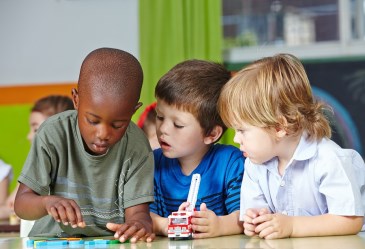
Friendship is an important part of kindergarten success. Young children need to feel accepted by their peers and have the skills to play cooperatively, productively, and positively with others.
What Your Child Should Know
Entering a new community of peers can be challenging. Your child should know:
- How to make new friends in his kindergarten classroom
- How to play successfully with others
- How to be a good friend to others
How You Can Help
One of the most important things you can do to promote social development in your child is to give him ample time to play with other children his own age. Self-directed play with peers offers young children the opportunity to make up their own rules, negotiate, collaborate, and make decisions. As you seek to provide opportunities for your child to spend time with friends, look for opportunities that will offer ample time in self-directed play. Some options to consider include the following:
- Inviting one of your child’s friends over to play at your house is one way to give your child quality time and a chance for social interaction. However, try to balance that with a play date at the friend’s house as well. Your child needs to experience time with friends both at home and away from home. Location makes a difference in how young children choose to play and the types of skills they develop.
- Consider signing your child up for local classes at a gym but remember that in a structured environment, like a gymnastic class, the play is being guided by an instructor rather than being self-directed by your child and his friends. Your child needs a balance of structured and unstructured play-time opportunities.
- Think about enrolling your child in a preschool program. Whether he attends a part- or full-time preschool, your child will get the benefit of spending time with a broader range of children than those his own age. However, you should still inquire about the preschool’s position on play. If the majority of the day is consumed with instruction and teacher-directed table activities, your child will once again be missing out on the opportunity for self-directed play.
- If your child will be attending a half- or full-day prekindergarten class, inquire about the amount of time set aside for self-directed play. If the time is limited, then make your own plans for helping your child get the time he needs in self-directed play.
Reflect, Revise, Revisit
As you reflect on your child’s play experiences, consider how much time your child is given to freely play with his friends. Don’t monopolize your child’s play time with specific plans made by an adult. Any time with friends is valuable to a child, but developing social skills during unstructured, self-directed playtime with a friend is precious.





